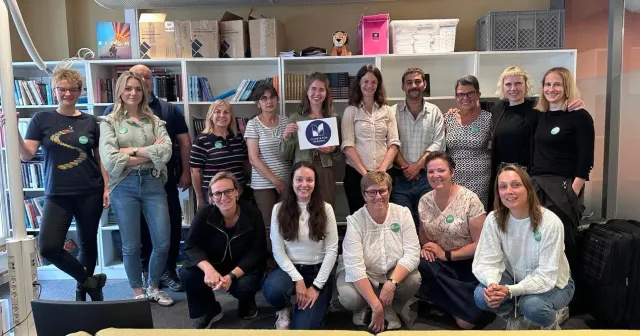Building Digital Marketing Skills for Libraries: Insights from the Erasmus+ Project
The rapid advancement of the internet and digital technology has transformed communication and business across all sectors, including librarianship. Libraries today are more than just places to read and borrow books; they are vibrant hubs of digital learning and interaction. To keep up with the demands of the digital age, libraries increasingly rely on digital communication channels to reach users effectively and assess service impact.
In response to these evolving needs, through The Erasmus+ project “Up-skill and Re-skill Librarians in Modern Marketing Solutions Curriculum” a comprehensive curriculum is created focusing on the digital transformation of librarians. This curriculum integrates essential skills in digital marketing, communication, and technology, equipping librarians with the tools needed for effective digital outreach. Covering topics from digital marketing and communication to graphic design, AI tools, and digital analytics, it offers a hands-on approach to continuous professional development.
Curriculum Development
Following the survey and deep-dive interview analysis, several key priorities were identified to ensure that the curriculum meets the specific needs of libraries. First, raising awareness of the critical role digital marketing plays in today’s library environment is essential. Recognizing that libraries often face financial constraints, the curriculum is designed with these limitations in mind, allowing for adaptable implementation. Additionally, the curriculum is tailored to accommodate varying staff sizes across libraries, ensuring that no matter how many employees libraries have, they can effectively integrate these skills into their operations. To support ongoing development, the curriculum is also structured for future updates and improvements, keeping it adaptable to the evolving digital landscape.
The curriculum draft was created by project team members, with further development carried out by library science experts Mirjana Nešić (Serbia) and Loredana Stanciu (Romania), along with digital marketing and communications specialists i from the Faculty of Media and Communications: Simona Žikić, Nataša Krstić (Serbia), and Diana Ghiorgies (Qulto, Romania).
The curriculum consists of nine modules designed to equip librarians with critical skills, including:
- Introduction to Digital Communication Channels
- Target Groups and Online Community Development
- Content Creation – Copywriting
- Content Creation – Visual Content
- Social Media Management
- SEO Fundamentals
- Licensing Systems and Copyrights
- Email Marketing Strategies
- Developing a Digital Marketing and Communication Plan for Libraries
These modules cover both foundational and advanced aspects of digital marketing, empowering libraries to enhance their digital presence and boost user engagement. This curriculum ensures that librarians stay ahead of digital trends to effectively support the evolving needs of modern users.
Each module emphasizes practical learning and collaboration with industry experts, focusing on real-world applications of digital marketing in libraries. The methodology includes interactive workshops, case studies, online resources, partnerships with professionals, and ongoing assessments and feedback loops, all of which are designed to foster hands-on learning and skill refinement.
At the end of each module, librarians will find a list of Serbian and Romanian experts in specific areas of digital marketing. These lists include expert contacts with names, short biographies, and contact information, ensuring librarians have access to additional guidance and support.
Enhancing Collaboration through Study Visits
Two study visits were of great importance for fostering collaboration, analyzing survey results, driving conclusions and refining the curriculum.
During the first visit (May 7-9) project team members from Romania (Ioana Crihana and Stefania Stanica) visited Serbia, to collaboratively analyze data collected through surveys and interviews. The second visit, when Serbian team (Marija Rakić Šaranac and Jasmina Marković) visited Romania (September 17-20), focused on finalizing the curriculum and preparing for the introductory training session. This session aims to raise librarians' professional awareness by improving their understanding of digital communication channels and the application of digital marketing within libraries. Led by one or two experts involved in the curriculum's development, the session will provide participants with insights on how effective marketing can increase library visibility and engagement. Feedback gathered from the workshop will enable experts to refine the curriculum, which will be finalized and made available to a broader audience by the end of the year upon project completion. These exchanges were instrumental in aligning goals and strengthening cross-border collaboration.
The cultural visits during the study exchange enriched the both team’s understanding of for one another’s heritage, reinforcing the collaborative bond between the two teams. These shared experiences highlighted not only the importance of respecting each other’s cultural values but also the vital role of modern promotion solutions, including digital marketing, in preserving and sharing cultural heritage. Participants explored how libraries can partner with cultural institutions to celebrate and promote local and national traditions, attracting diverse audiences. This approach addresses a key challenge and opportunity for libraries in both countries—using modern marketing to elevate cultural heritage and foster international collaboration.
Conclusion
In today’s rapidly changing digital landscape, libraries must go beyond their traditional roles to become proactive digital and cultural hubs. The Erasmus+ project “Up-skill and Re-skill Librarians in Modern Marketing Solutions Curriculum” addresses this need by developing a curriculum in digital marketing. Once implemented, this curriculum will empower librarians to use digital tools to promote their collections and services effectively. Through modules that cover everything from online communication channels to creating a full digital marketing plan, librarians are gaining tools to enhance user engagement, optimize services, and showcase their libraries’ unique cultural offerings.
Study visits have played a very important role in this initiative, fostering cross-border collaboration and knowledge exchange between Romania and Serbia. These visits not only refined the curriculum through real-world insights but also deepened cultural appreciation, inspiring new strategies to promote heritage in ways that resonate with today’s audiences.
For more information, please visit the project’s Webpage and Facebook page
Project details: Up-skill and re-skill librarians in modern marketing solution curriculum, Funded by the Erasmus+ program, KA210-ADU – small-scale partnerships in adult education, Call 2023, Second Round, Project ID: 2023-2-RS01-KA210-ADU-000174177.
Project duration: 1.1.2024-31.12.2024.
Project coordinator: Narodna biblioteka "Vuk Karadžić", Kragujevac, Srbija
Partner organization: Asociatia Nationala a Bibliotecarilor si Bibliotecilor Publice din Romania




